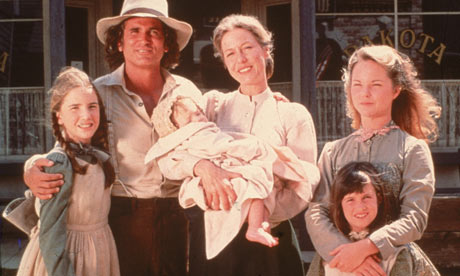
My nine-year-old daughter loves to read. And unusually, she loves to read classic children's literature. This should make me both happy and smug. And mostly it does. But it also makes for all kinds of dilemmas.
When she was about eight, we read Little House on the Prairie by Laura Ingalls Wilder. She was immersed in the bucolic delights of pioneer life, when suddenly she was catapulted into the world of a bigot. "The only good Indian is a dead Indian," is repeated several times by various characters, as the book goes on to describe Indians as "wild", "terrible", "savage warriors" and "screaming devils". Then Charles Ingalls, Laura's father, says, "When the white settlers come into a country, the Indians have to move on. White people are going to settle all this country." " Why do the Indians have to move when they were there first?" asked my daughter. I began to talk about how the world of the 19th-century settler was very different from ours. But eight-year-olds see the world in black and white. "I hate Laura's family!" yelled my daughter. And that was that for Little House on the Prairie, for another year at least.
There are many children's classics that I devoured as a child, but on rereading them I discover knobbly bits that stick in my craw. Like The Secret Garden, where the heroine Mary, newly arrived from India, is outraged at being mistaken for "a black". "You thought I was a native! They are not people – they are servants who must salaam to you," she sputters. Or the blithe stereotypes of Enid Blyton in her admittedly addictive St Clare series (let's not even talk about Noddy) where French spitfire Claudine displays a variety of "un-English" behaviour such as cheating and fibbing. In the end, Claudine declares, "the English sense of honour is a fine thing". As my daughter happily gobbles Blytons like cookies, I wonder how to explain away old Enid's consistent portrayal of Gypsies as thieving, rascally, child-thumping varmints. Tintin was a beloved part of my childhood, but after reading about the revolting Tintin in the Congo (African women bowing and intoning "White master is very great!") I will never feel quite the same again.
I have to wonder what message I am sending my daughter, especially since as an Indian Hindu girl she might once have been that "savage" or "heathen". There are those who argue that racist authors were just a product of less enlightened times. "That's just the way people were back then," they say, pointing out that Wilder, and others of her ilk, were far less racist than many of their time. I don't disagree, but not talking about why things were the way they were seems foolish.
Most people I know just ignore the racism, as my parents did. Many are just thankful that their kids are reading. That's certainly the easier way out, but I'd like my daughter to read the classics critically. Particularly because in India – where we currently live – many classics are prescribed as school textbooks and therefore accepted as near gospel truth. As I read with her, I constantly tell her, "That's the way people were back then, but that doesn't make it right." I'd like her to enjoy the sublime prose of Rudyard Kipling and Rider Haggard while challenging their covert, and sometimes overt, imperialism.
Of course, there is such a thing as looking too hard for racism, and that way madness most certainly lies. I didn't get the memo, but apparently the Chronicles of Narnia, Babar and even Peter Pan are all racist now. The list of banned books that offend someone or something is ever growing. I don't want my daughter feverishly scrutinising books for things to be offended by, and I would never support a ban on any book. I want her to hate the prejudice, not the author.
I could simply focus on reading modern children's literature, replete with Asian heroines and positive role models. But I think the classics, even the dodgy ones, have lessons to teach modern children. Currently, we are reading a simplified version of The Adventures of Huckleberry Finn, and talking about why she can't use the "N" word. "But Mark Twain uses it," she says. "Was he a racist?" "Why don't you tell me when you have read it?" I suggest. And she does. We begin talking about slavery and end up talking about Barack Obama. Finally, we reach the conclusion that yes, we shouldn't use the N word, but no, Twain was not a racist. This is not a conversation that I can imagine myself having while reading Harry Potter.
And yes, we have returned to the Little House series. Thanks to Wilder, my daughter now knows about the plight of the American Indian. "I think Laura wasn't a very nice person, but we should read her books anyway because she's a very good author," she says. Exactly.

